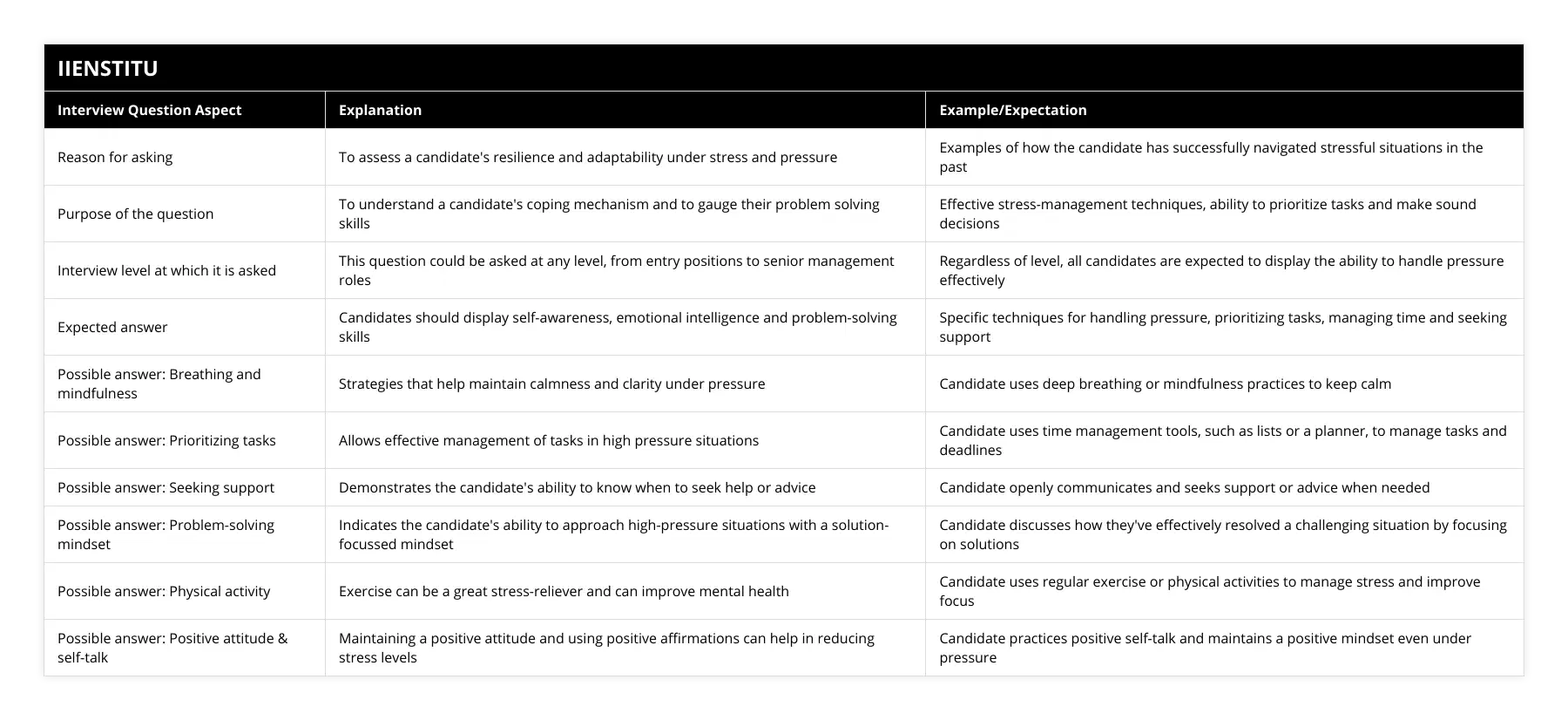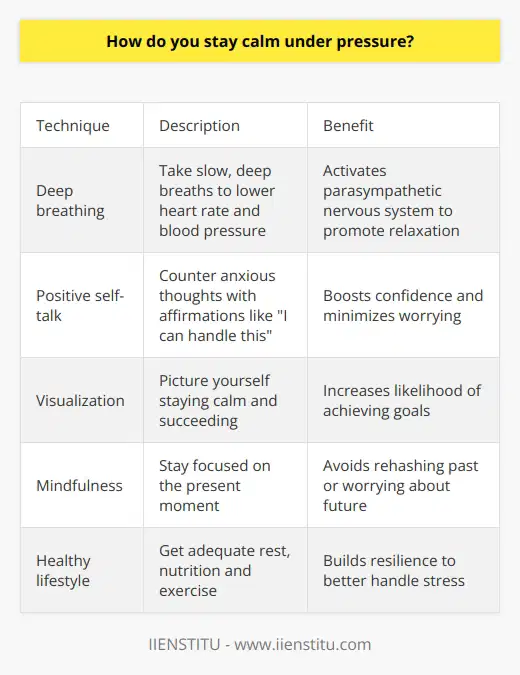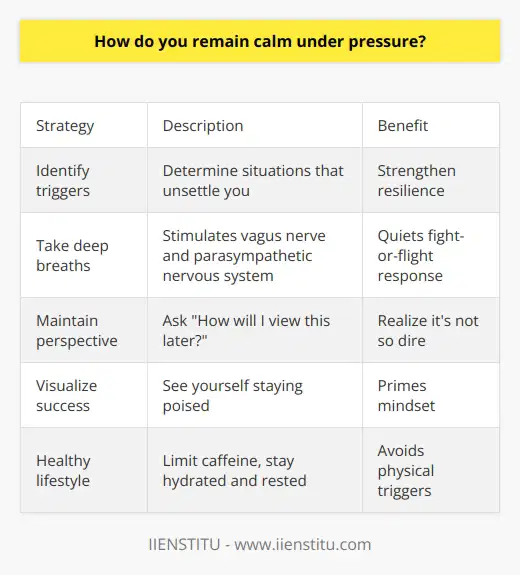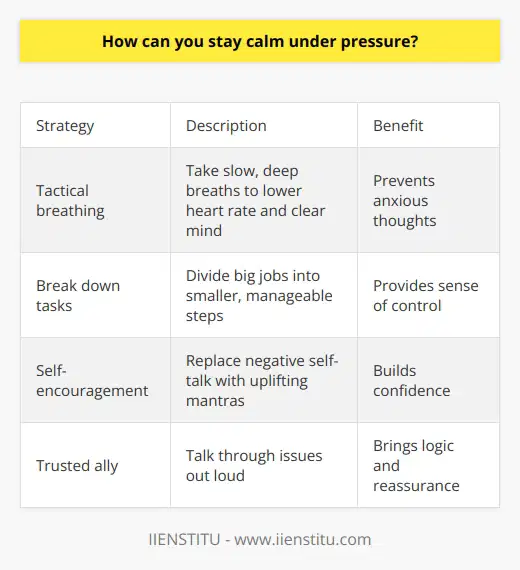
In today's fast-paced and demanding work environment, the ability to stay calm under pressure is a highly valued skill. Employers are constantly in search of individuals who can maintain composure during challenging situations. The question, "How do you stay calm under pressure?" is commonly asked during interviews, as it provides insight into a candidate's ability to handle stress and maintain productivity.
This article aims to explore the reasons behind this interview question, the purpose it serves, the interview level at which it is asked, the expected candidate response, and possible answers to consider.
Why is this interview question asked: How Do You Stay Calm Under Pressure?
The question "How do you stay calm under pressure?" is asked to determine how well a candidate can handle stressful situations and cope with high-pressure scenarios in the workplace. As the nature of many jobs involves tight deadlines, challenging projects, and unexpected setbacks, employers want to ensure that their potential employees possess the emotional intelligence and resilience required to navigate through these circumstances successfully.
Purpose of the question:
The purpose of asking this question is to assess an individual's ability to deal with workplace stress and pressure effectively. By understanding how candidates manage their emotions in tense situations, employers can gauge their level of professionalism, adaptability, and problem-solving skills. This question provides employers with valuable insights into a candidate's coping strategies and their suitability for the role.
At what interview level is it asked?
The question "How do you stay calm under pressure?" is often asked at various interview levels, ranging from entry-level positions to senior management roles. While the expectations and responsibilities may differ according to the position, the ability to handle pressure is seen as a crucial skill across all levels. Employers believe that individuals who can remain calm in challenging situations are better equipped to make sound decisions and effectively manage teams.
How To Answer What Time Management Technique Starts Your Day İnterview Question
Strategies For Maintaining Relationships İn Dynamic Supply Chains
How To Answer What Relaxes You During Stressful Times İnterview Question
What kind of answer is expected from the candidate?
When answering this question, candidates are expected to showcase their self-awareness, emotional intelligence, and problem-solving abilities. Employers are particularly interested in candidates who use specific techniques or strategies to remain calm, as this demonstrates a proactive and mature approach to handling pressure. Additionally, candidates should emphasize their ability to prioritize tasks, manage time effectively, and seek support when needed.
Possible answers to consider:
Focus on breathing and mindfulness techniques:
Candidates can describe their practice of deep breathing exercises and mindfulness techniques to stay centered and composed under pressure. This may involve taking slow, deep breaths, visualizing a calming scenario, or using apps that promote relaxation and stress reduction.Prioritizing tasks and time management:
Candidates can highlight their ability to prioritize tasks when under pressure. This may involve creating to-do lists, breaking down complex tasks into manageable steps, and allocating time effectively to meet deadlines. Effective time management tactics can contribute significantly to reducing stress levels and staying calm.Seeking support and communication:
Acknowledging that pressure can sometimes become overwhelming, candidates can stress the importance of seeking support from colleagues, superiors, or mentors. Open communication channels and the willingness to ask for guidance or share concerns can help alleviate stress and promote a calm mindset.Preparing for pressure through practice:
Candidates can discuss their proactive approach to managing pressure by preparing in advance. This may include simulating high-stress scenarios, participating in relevant training programs, or seeking out challenging projects to enhance their ability to handle pressure.Maintaining a healthy work-life balance:
Candidates can emphasize the role of a balanced lifestyle in managing pressure. Demonstrating a commitment to self-care, such as regular exercise, hobbies, and spending time with loved ones, can contribute to improved resilience and the ability to stay calm when faced with challenging situations.
Related Course: Time Management Course Online
What to consider when answering:
Be authentic and genuine in your response, sharing real-life examples if possible.
Highlight your ability to adapt and learn from past experiences.
Emphasize your problem-solving skills and resourcefulness in finding solutions.
Showcase your ability to maintain professionalism and composure even during high-pressure situations.
Tailor your answers to align with the specific requirements of the role and industry.
In conclusion, mastering the art of staying calm under pressure is an essential skill sought after by employers across a wide range of industries.
By understanding the reasons behind this interview question and the qualities employers are looking for in a candidate's response, individuals can effectively demonstrate their ability to handle stress, adapt to challenging circumstances, and maintain productivity.
Employing strategies such as deep breathing, time management, seeking support, and maintaining a healthy work-life balance can significantly contribute to remaining calm and collected in high-pressure situations.
Remember, staying calm under pressure is not only beneficial for your professional growth but also for your overall well-being.
Strategies for managing stress and pressure
Techniques for maintaining composure in challenging situations
Effective ways to stay focused and level-headed under pressure
Similar interview questions:
Multiple-choice: What strategies can help you remain calm when facing pressure?
a) Meditation and deep breathing techniques
b) Listening to calming music or engaging in a hobby
c) Seeking support from trusted friends or family members
d) All of the aboveFill in the blank: One effective method for staying calm amidst pressure is practicing _______.
True or False: Remaining composed during high-pressure situations is a skill that can be learned and developed over time.
Short answer: Can you share any personal anecdotes or experiences where you successfully maintained your composure in a stressful situation?
Rank in order of importance: Prioritize the following techniques for staying calm under pressure from most effective (1) to least effective (5):
Taking regular breaks to relax and recharge
Visualizing a positive outcome or solution
Using positive self-talk and affirmations
Engaging in physical exercise or activities
Seeking support or advice from a mentor or coach
Scenario-based: Imagine you are faced with a tight deadline and multiple projects to complete. Describe step-by-step how you would handle the situation while keeping calm and focused.
Yes/No: Is it possible to train your mind to perceive pressure as a motivating force rather than a stressor?
Opinion-based: In your opinion, what role does a supportive work environment play in helping individuals cope with pressure?
Comparison: Compare and contrast two different methods you find effective for managing stress and staying composed under pressure.
Picture response: Choose a picture that represents how you feel when staying calm under pressure and explain why you believe it relates to the topic.

Frequently Asked Questions
How do you stay calm under pressure?
Staying calm under pressure requires various techniques and strategies.
Firstly, it is essential to manage stress levels effectively through deep-breathing exercises and meditation. By focusing on one's breath, individuals can relax their minds and bodies, enabling them to remain composed during stressful situations.
Additionally, maintaining a positive mindset and reframing negative thoughts can significantly contribute to staying calm. Engaging in physical activities or hobbies can also alleviate stress and provide an outlet for tension. Breaks, proper time management, and setting realistic goals assist in reducing overwhelming feelings.
Moreover, practicing effective communication and assertiveness skills helps to express concerns and obtain support from others.
Finally, embracing self-care practices such as getting sufficient sleep, eating a balanced diet, and engaging in relaxation techniques can enhance one's ability to face pressure calmly.

How do you remain calm under pressure?
Remaining calm under pressure can be achieved through various strategies. One effective technique involves focusing on deep and controlled breathing.
By inhaling deeply and exhaling slowly, you can activate the body's relaxation response, leading to a sense of tranquility. Another helpful approach is to engage in positive self-talk, reminding yourself of your capabilities and previous successes.
Additionally, organizing and prioritizing tasks can help manage overwhelming situations, as it allows for a structured and systematic approach. Seeking social support by communicating with trusted individuals can also alleviate stress.
Moreover, practicing mindfulness and staying present in the moment can decrease anxiety and enhance calmness. Developing a proactive mindset and anticipating potential challenges beforehand can further contribute to maintaining composure.
Finally, engaging in regular physical exercise and adopting healthy lifestyle habits can bolster resilience and increase overall stress tolerance. By implementing these strategies, individuals can effectively remain calm in the face of pressure.

How can you stay calm under pressure?
Remaining calm under pressure can be achieved by following a few strategies.
Firstly, taking deep breaths and focusing on one task at a time can help reduce stress and anxiety.
Additionally, practicing mindfulness and staying present in the moment can prevent overwhelming feelings.
Moreover, maintaining a positive mindset and believing in one s abilities can boost self-confidence and minimize pressure.
Finally, prior preparation, effective time management, and seeking support from others can also contribute to staying calm in demanding situations. By implementing these techniques, individuals can successfully navigate through pressure-filled situations.



